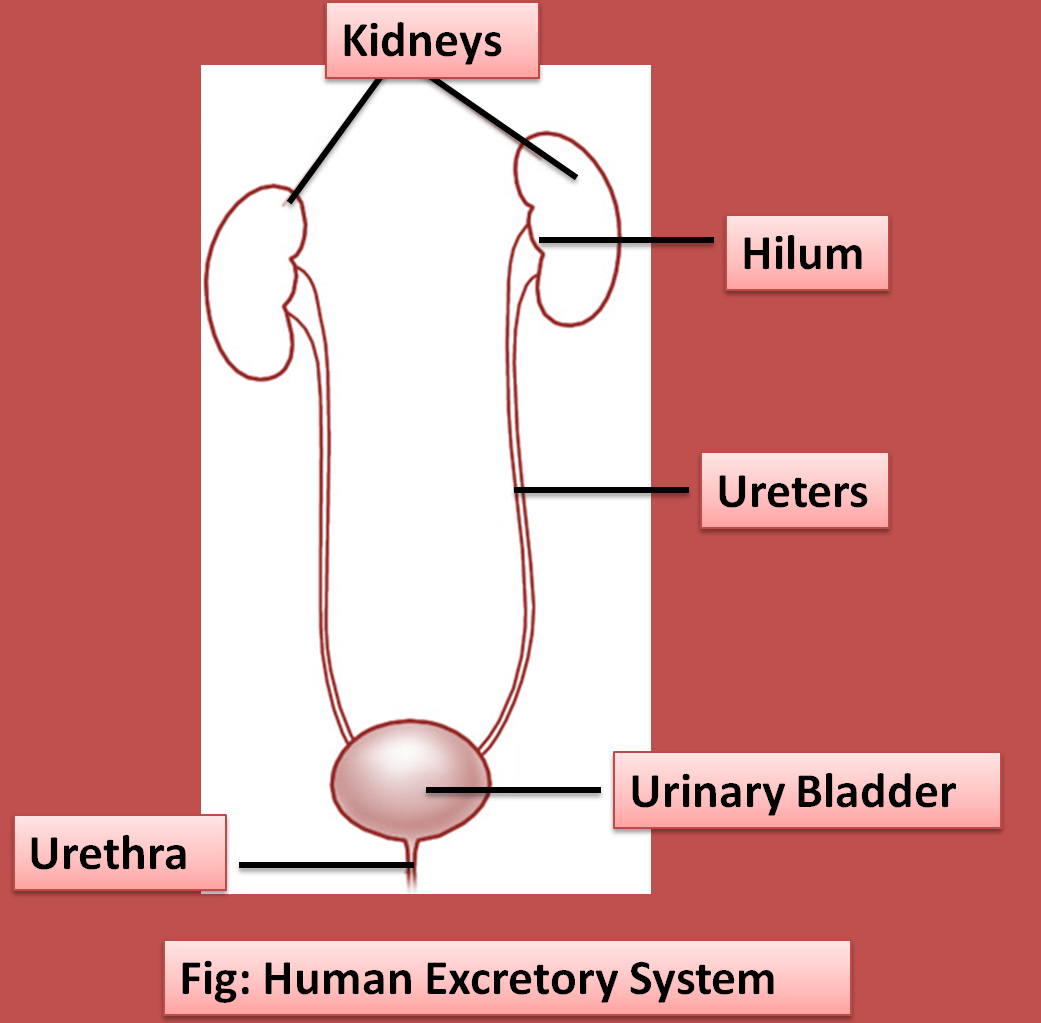
Draw a neat and well labelled diagram of the human excretory system
Answer
594.6k+ views
Hint: The excretory system is a biological system that removes excess or unnecessary materials from the body of an organism and helps to maintain chemical homeostasis and prevent damage to the body. The excretory system performs two main functions of elimination of the metabolic waste products and draining the body of used up and broken-down components.
Complete answer:
The human excretory system is primarily formed by the urinary system. The urinary system is formed of kidneys, ureters, urinary bladder, and the urethra.

Kidneys are large bean-shaped organs that are present on either side of the vertebral column in the abdominal cavity. Kidneys have a retroperitoneal position. The kidneys filter the nitrogenous wastes such as urea, as well as salts and excess water, and excrete them in the form of urine.
This is done with the help of millions of nephrons present in each kidney which are the structural and functional units of the excretory system.
The primary function of the kidneys is to eliminate the waste from the blood. They also perform homeostatic functions like maintaining the volume of extracellular fluid, maintaining ionic balance, pH and osmotic concentration regulation, and excretion of toxic metabolic by-products.
The urine formed in the kidneys is transported to the urinary bladder by muscular ducts called ureters. They are usually 25–30 long. The ureters run posteriorly on the lateral walls of the pelvis.
The urinary bladder is the organ that collects waste excreted by the kidneys in the form of urine. It is a hollow muscular, and distensible organ that sits on the pelvic floor. Urine enters the bladder via the ureters and gets collected there and exits via the urethra during the process of micturition.
Anatomically, the urethra is a tube that expels the urine from the bladder to the outside in both the genders.
Note: The urinary system is the main system for excretion, but it is not the only system for excretion.
Waste products are also eliminated from the body in the form of gases from the respiratory system. Some waste products can also be eliminated directly from the pores on the skin while some products are also excreted through the biliary system and gastrointestinal tract.
Complete answer:
The human excretory system is primarily formed by the urinary system. The urinary system is formed of kidneys, ureters, urinary bladder, and the urethra.

Kidneys are large bean-shaped organs that are present on either side of the vertebral column in the abdominal cavity. Kidneys have a retroperitoneal position. The kidneys filter the nitrogenous wastes such as urea, as well as salts and excess water, and excrete them in the form of urine.
This is done with the help of millions of nephrons present in each kidney which are the structural and functional units of the excretory system.
The primary function of the kidneys is to eliminate the waste from the blood. They also perform homeostatic functions like maintaining the volume of extracellular fluid, maintaining ionic balance, pH and osmotic concentration regulation, and excretion of toxic metabolic by-products.
The urine formed in the kidneys is transported to the urinary bladder by muscular ducts called ureters. They are usually 25–30 long. The ureters run posteriorly on the lateral walls of the pelvis.
The urinary bladder is the organ that collects waste excreted by the kidneys in the form of urine. It is a hollow muscular, and distensible organ that sits on the pelvic floor. Urine enters the bladder via the ureters and gets collected there and exits via the urethra during the process of micturition.
Anatomically, the urethra is a tube that expels the urine from the bladder to the outside in both the genders.
Note: The urinary system is the main system for excretion, but it is not the only system for excretion.
Waste products are also eliminated from the body in the form of gases from the respiratory system. Some waste products can also be eliminated directly from the pores on the skin while some products are also excreted through the biliary system and gastrointestinal tract.
Recently Updated Pages
Master Class 11 Computer Science: Engaging Questions & Answers for Success

Master Class 11 Business Studies: Engaging Questions & Answers for Success

Master Class 11 Economics: Engaging Questions & Answers for Success

Master Class 11 English: Engaging Questions & Answers for Success

Master Class 11 Maths: Engaging Questions & Answers for Success

Master Class 11 Biology: Engaging Questions & Answers for Success

Trending doubts
One Metric ton is equal to kg A 10000 B 1000 C 100 class 11 physics CBSE

There are 720 permutations of the digits 1 2 3 4 5 class 11 maths CBSE

Discuss the various forms of bacteria class 11 biology CBSE

Draw a diagram of a plant cell and label at least eight class 11 biology CBSE

State the laws of reflection of light

Explain zero factorial class 11 maths CBSE




